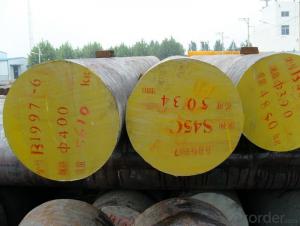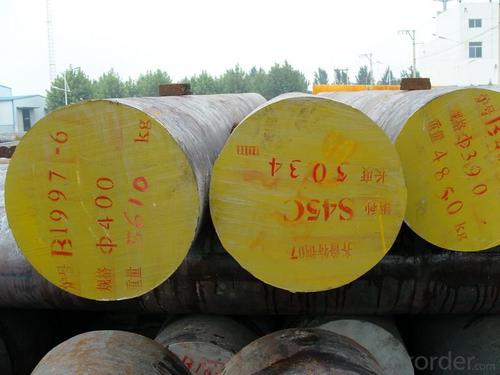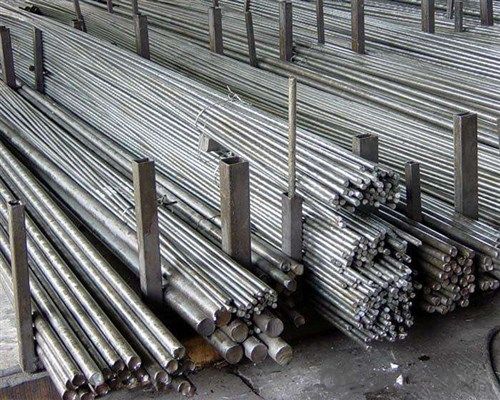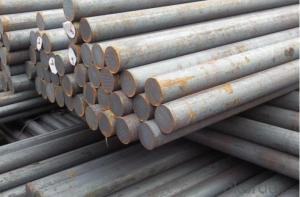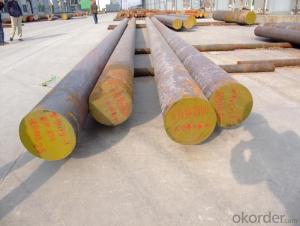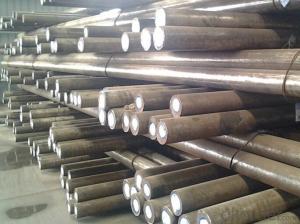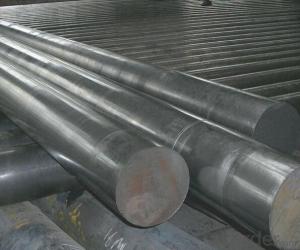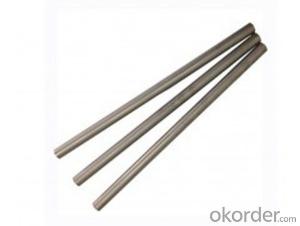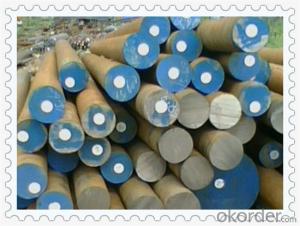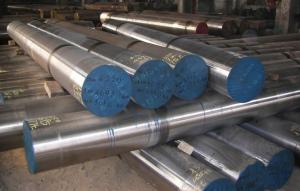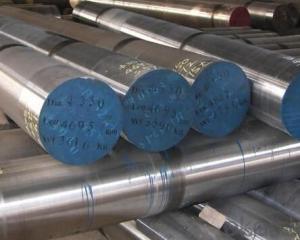Special Steel SUJ2 Bearing Steel Round Bar
- Loading Port:
- China main port
- Payment Terms:
- TT OR LC
- Min Order Qty:
- 30 m.t.
- Supply Capability:
- 10000 m.t./month
OKorder Service Pledge
OKorder Financial Service
You Might Also Like
Specification
Product information:
Standard | JIS | ||||||||||
Grade | SUJ2 | ||||||||||
MOQ | 1 Metric Ton | ||||||||||
Diameter | 8mm~1500mm | ||||||||||
Length | 6m,12m or as required. | ||||||||||
Diameter Tolerance | within the allowable range or as required. | ||||||||||
Condition of delivery | Hot rolled (forged) without annealing,annealing,cold drawn,polished or as required. | ||||||||||
Chemical Composition(%) | |||||||||||
C | Si | Mn | P | S | Cr | ||||||
0.95-1.05 | 0.15-0.35 | 0.25-0.45 | ≤0.025 | ≤0.025 | 1.40-1.65 | ||||||
Ni | Mo | Cu | Ni+Cu | ||||||||
≤0.30 | ≤0.08 | ≤0.25 | ≤0.50 | ||||||||
Mechanical Properties(In Quenching and Tempering) | |||||||||||
Tensile strength | Yield strength | Elongation | Reduction in Area | Impact | Hardness | ||||||
(σb/MPa) | (σs/MPa) | (δ5/%) | (ψ/%) | (J) | (HRC) | ||||||
861.3 | 518.42 | 27.95 | -- | -- | 25.8 | ||||||
Product Show:
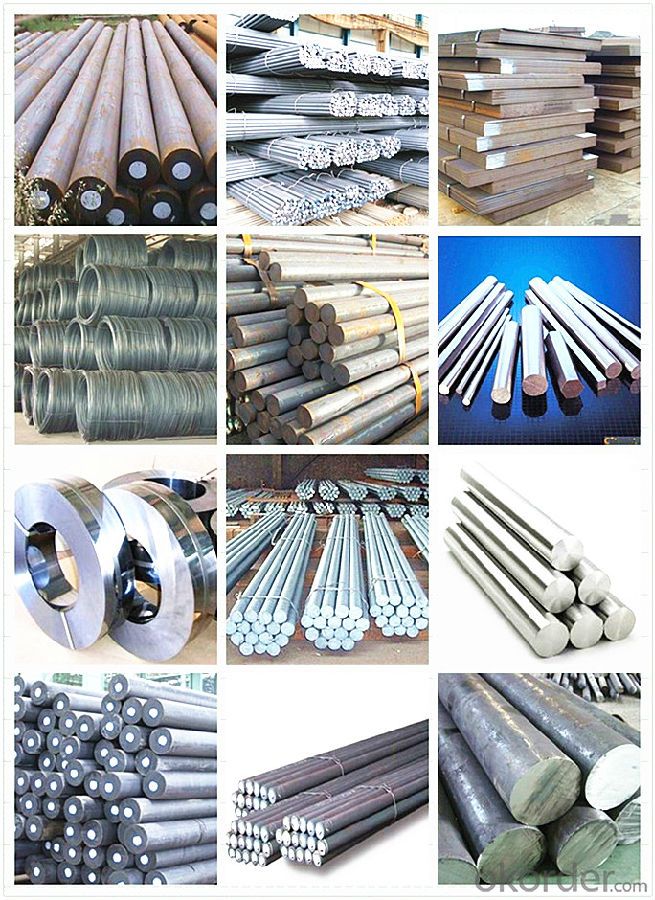
Workshop Show:
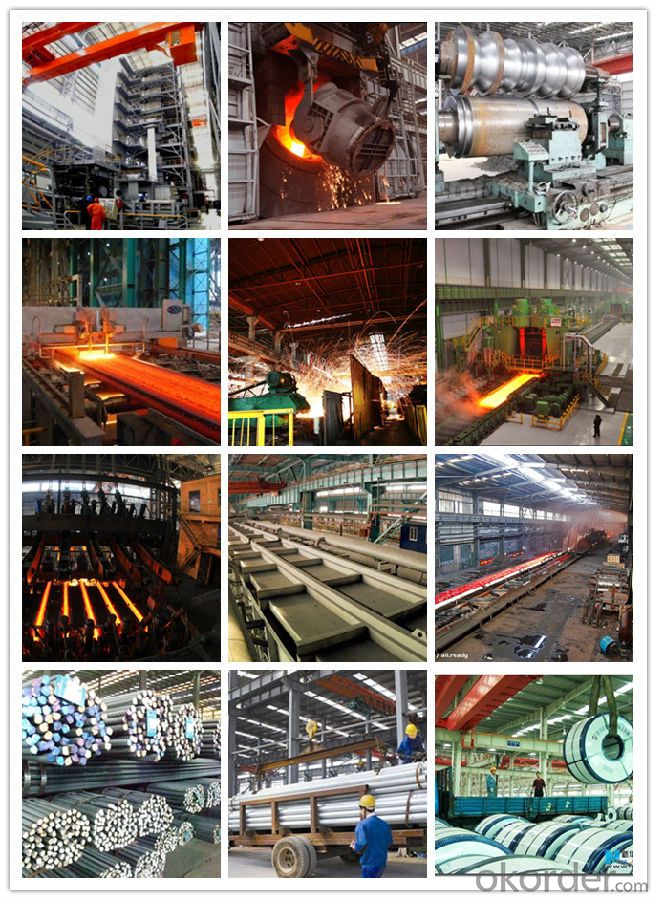
Shipping
1. FedEx/DHL/UPS/TNT for samples, Door-to-Door;
2. By Air or by Sea for batch goods, for FCL; Airport/ Port receiving;
3. Customers specifying freight forwarders or negotiable shipping methods!
Delivery Time: 3-7 days for samples; 5-25 days for batch goods.
Payment Terms
1.Payment: T/T, L/C, Western Union, MoneyGram,PayPal; 30% deposits; 70% balance before delivery.
2.MOQ: 1pcs
3.Warranty : 3 years
4.Package Informations: 1) EXPORT, In 20 feet (GW 25 ton) or 40 feet Container (GW 25 ton)
2)as customer's requirement
Why choose us?
(1) The leading exporter in China special steel industry.
(2) Large stocks for various sizes, fast delivery date.
(3) Good business relationship with China famous factories.
(4) More than 7 years steel exporting experience.
(5) Good after-sales service guarantee.
- Q: How does special steel contribute to the power generation machinery industry?
- Special steel plays a crucial role in the power generation machinery industry as it provides the necessary strength, durability, and resistance to extreme temperatures and corrosion. The use of special steel in components such as turbine blades, generator shafts, and boiler tubes enhances the overall efficiency and reliability of power generation machinery. Additionally, special steel's unique properties enable the production of more compact and lightweight equipment, leading to improved performance and reduced energy consumption.
- Q: How does special steel contribute to the agricultural sector?
- Special steel contributes to the agricultural sector in several ways. Firstly, special steel is known for its strength and durability, making it an ideal material for manufacturing various agricultural machinery and equipment. This includes tractors, plows, harvesters, and irrigation systems, among others. These machines require robust and reliable components that can withstand the demanding conditions of agricultural work, and special steel provides the necessary strength and resistance to wear and tear. Additionally, special steel can be used to produce high-quality cutting tools that are essential in farming operations. Implements such as sickles, scythes, and pruning shears need to have sharp and durable blades to efficiently cut through vegetation. Special steel's hardness and strength make it a suitable material for manufacturing these tools, ensuring they retain their sharpness even after prolonged use. Furthermore, special steel can contribute to the agricultural sector by enabling the construction of sturdy and durable infrastructure. Agricultural buildings, storage facilities, and fencing often require strong and corrosion-resistant materials to withstand the elements and protect crops, livestock, and equipment. Special steel, with its resistance to rust and structural integrity, can be used in the construction of barns, silos, sheds, and fencing, providing long-lasting and reliable structures. In conclusion, special steel plays a crucial role in the agricultural sector by providing the necessary strength, durability, and corrosion resistance required for the manufacturing of machinery, cutting tools, and infrastructure. Its properties contribute to improved efficiency, productivity, and reliability in agricultural operations, ultimately benefiting farmers and the overall agricultural industry.
- Q: How does special steel perform in molding applications?
- Due to its exceptional properties and performance, special steel is highly favored in molding applications. Firstly, its excellent hardness and wear resistance ensure that it remains undamaged and maintains its shape even under high pressure and temperature during the molding process. Additionally, special steel's superb thermal conductivity allows for efficient heat transfer, resulting in uniform heating and cooling of the mold. This leads to consistent and high-quality molded products and reduces cycle times, thus enhancing productivity. Furthermore, special steel's superior corrosion resistance prevents any chemical reactions or rusting, ensuring its durability and longevity even when exposed to moisture or corrosive substances. When it comes to machinability, special steel is easily workable, enabling precise and intricate mold designs. This facilitates the production of detailed molded products with high accuracy and dimensional stability. Lastly, special steel's excellent strength and toughness make it highly resistant to cracking or fracturing under high stress conditions. Consequently, this guarantees the longevity and reliability of the mold, minimizing the need for frequent repairs or replacements. Overall, the exceptional properties of special steel, including hardness, wear resistance, thermal conductivity, corrosion resistance, machinability, and strength, make it an ideal choice for molding applications. It ensures high-quality and consistent molded products, increased productivity, and extended lifespan for the molds.
- Q: What are the properties of ultra-high-strength alloy steel?
- Ultra-high-strength alloy steel possesses exceptional strength and durability due to its unique composition. It typically contains a combination of various metals, such as chromium, nickel, and molybdenum, which contribute to its enhanced mechanical properties. This type of steel exhibits superior tensile strength, allowing it to withstand extremely high loads and resist deformation. Additionally, it offers excellent toughness, meaning it can absorb energy without fracturing. Ultra-high-strength alloy steel also exhibits good corrosion resistance, making it suitable for applications in harsh environments. Overall, its remarkable properties make it an ideal choice for demanding engineering and structural applications.
- Q: How does special steel contribute to the power generation equipment industry?
- Special steel plays a crucial role in the power generation equipment industry by providing exceptional strength, durability, and corrosion resistance. It is extensively used in the manufacturing of turbines, generators, and other critical components, ensuring their reliable performance under extreme conditions. Special steel's high temperature and pressure resistance make it ideal for power plants, enabling efficient energy conversion and minimizing downtime. Additionally, its ability to withstand harsh environments and resist fatigue and wear extends the lifespan of power generation equipment, reducing maintenance costs and enhancing overall productivity in the industry.
- Q: What are the different methods of improving the corrosion resistance of special steel?
- There are several methods available for improving the corrosion resistance of special steel. Some of the commonly used methods include: 1. Alloying: One of the most effective ways to enhance corrosion resistance is by alloying the steel with specific elements. For example, adding chromium to steel forms a protective chromium oxide layer on the surface, which acts as a barrier against corrosion. Other elements like molybdenum, nickel, and copper can also be added to improve corrosion resistance. 2. Surface treatments: Various surface treatments can be applied to the steel to enhance its corrosion resistance. For instance, galvanizing involves coating the steel with a layer of zinc, which protects it from corrosion. Electroplating is another method where a thin layer of a more corrosion-resistant metal, such as nickel or chromium, is deposited onto the steel surface. 3. Passivation: Passivation is a chemical process that removes free iron and other contaminants from the steel surface, creating a passive film that aids in corrosion resistance. This method is commonly used for stainless steel, where a thin layer of chromium oxide is formed by treating the steel with an oxidizing agent like nitric acid. 4. Protective coatings: Applying protective coatings on the steel surface can significantly improve its corrosion resistance. There are various types of coatings available, such as paints, epoxy coatings, and ceramic coatings. These coatings act as a barrier between the steel and the corrosive environment, preventing direct contact and corrosion. 5. Heat treatment: Heat treatment techniques like annealing, quenching, and tempering can modify the microstructure of the steel, enhancing its corrosion resistance. Heat treatment can improve the steel's mechanical properties, reduce residual stresses, and remove impurities, all of which contribute to better corrosion resistance. 6. Design considerations: Proper design and construction techniques can play a crucial role in improving the corrosion resistance of special steel. For example, eliminating sharp corners and crevices where corrosion can occur, using appropriate drainage systems, and ensuring proper ventilation can prevent the accumulation of moisture and corrosive agents. It is worth noting that the selection of the most suitable method depends on the specific application, environment, and desired level of corrosion resistance. A combination of these methods may also be employed to achieve optimal results.
- Q: How does special steel contribute to the industrial equipment industry?
- Special steel contributes to the industrial equipment industry by offering superior strength, durability, and resistance to corrosion and wear. It allows manufacturers to produce high-quality components and machinery that can withstand extreme conditions, resulting in longer equipment lifespan and improved performance. Additionally, special steel's versatility enables the production of complex shapes and sizes, leading to enhanced design possibilities and increased efficiency in various industrial applications.
- Q: What are the different heat treatment methods for special steel?
- There are several heat treatment methods for special steel, including annealing, quenching, tempering, and normalizing. Annealing involves heating the steel to a specific temperature and then slowly cooling it to improve its machinability and reduce internal stresses. Quenching is a rapid cooling process that makes the steel harder and more brittle, but also increases its strength. Tempering is a heat treatment process that involves reheating quenched steel to a specific temperature and then cooling it again to improve its toughness and reduce brittleness. Normalizing is another heat treatment method that involves heating the steel to a specific temperature and then cooling it in still air to improve its mechanical properties and refine its grain structure.
- Q: What are the different carburizing techniques used for special steel?
- There are several carburizing techniques used for special steel, including gas carburizing, liquid carburizing, pack carburizing, and vacuum carburizing. These techniques involve introducing carbon into the surface of the steel to improve its hardness and wear resistance. Gas carburizing involves heating the steel in a carbon-rich gas atmosphere, while liquid carburizing immerses the steel in a molten salt bath. Pack carburizing involves surrounding the steel with a carbon-rich compound in a sealed container. Vacuum carburizing is done in a low-pressure environment to minimize oxidation. Each technique has its advantages and is chosen based on the specific requirements of the steel and desired outcome.
- Q: How does special steel contribute to the automotive suspension industry?
- Special steel contributes to the automotive suspension industry by providing high strength and durability to suspension components. It allows for lighter and more efficient designs, improving handling, stability, and overall performance of vehicles. Special steel also enhances safety by increasing the ability to absorb and dampen shocks and vibrations, resulting in a smoother and more comfortable ride for passengers.
Send your message to us
Special Steel SUJ2 Bearing Steel Round Bar
- Loading Port:
- China main port
- Payment Terms:
- TT OR LC
- Min Order Qty:
- 30 m.t.
- Supply Capability:
- 10000 m.t./month
OKorder Service Pledge
OKorder Financial Service
Similar products
Hot products
Hot Searches
Related keywords
